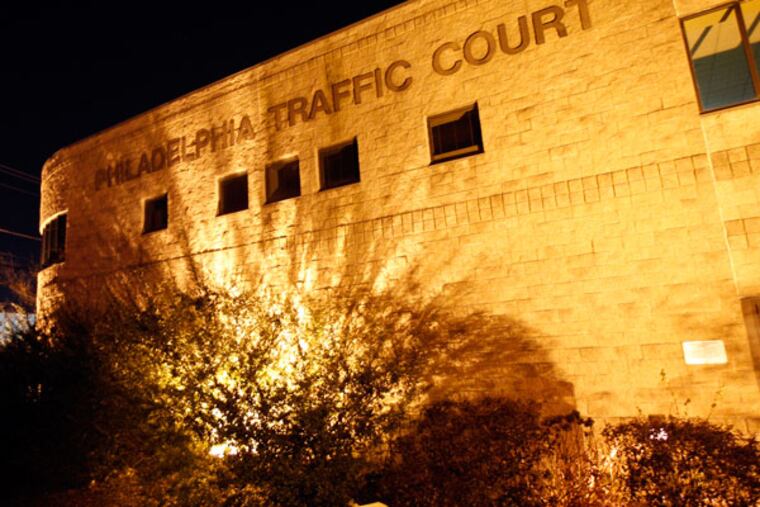Political machine flexing its muscles
With low turnout, labor and the local Democratic Party could hold huge sway in Tuesday's election.

TOMORROW, a tiny sliver of the city's residents will look at a scroll of names you've probably never heard and grant to a few the power to sentence criminals, negotiate divorces and adjudicate lawsuits for years to come.
"This is what I call a committeeman's election," said 33rd Ward Democratic Leader Donna Aument, of Kensington, referring to the power that members of the city's Democratic committees wield in off-year elections. Her daughter, Marnie Aument Loughrey, is running for Traffic Court.
Turnout is expected to be exceptionally low for the primary, meaning the several thousand votes that the local Democratic machine and labor unions can reliably produce for their chosen judicial candidates will be an even more influential force than usual.
The workings of the machine were on display yesterday at Doc's Union Pub, where ward leaders, campaign organizers, union officials and aspiring judges buzzed in and out all day. John Dougherty, business manager of the politically powerful International Brotherhood of Electrical Workers Local 98, was rallying the troops at a get-out-the-vote event in the Pennsport bar.
The union will spend about $1 million on the primary, said Dougherty, who is also 1st Ward leader. Asked whether low turnout gives labor or the party outsized influence, he said, "I don't worry about anybody else's vote; I only worry about our vote."
Twenty-three people are vying for six open seats on Philly's Common Pleas Court (salary: $173,271). Ten are in the running for three Municipal Court vacancies ($169,261). And an astonishing 27 candidates are on the ballot for three spots on Traffic Court ($91,052), which is mired in scandal and may be legislated out of existence by the time the victors are sworn in.
With no high-profile races on the ballot and an electoral hangover lingering from the presidential campaign, turnout could be historically low.
On the last day Philadelphians could register to vote in time for the primary, only 504 people did, City Commissioner Al Schmidt said. That's the lowest total on city records. And only 800 voters sent in absentee ballots, a "remarkably low figure," he said.
So how do candidates get the word out when the public is paying such little attention?
First, they fight like hell to get the endorsement of the Democratic City Committee, which will distribute about 337,000 sample ballots listing the candidates chosen by the city's ward leaders.
Henry Lewandowksi, a lawyer for Local 98, was endorsed by the party in his Municipal Court bid. Yesterday, he paraded around Pennsport with a Mummers-style string band on his heels, shaking hands and talking with residents.
Lewandowski is one of three candidates who have been endorsed by the Democratic City Committee but not recommended by the Philadelphia Bar Association. The Association doesn't disclose why candidates are turned down. Lewandowski said it was because he didn't have enough trial experience.
"The Municipal Court is referred to as 'the people's court,' " he said. "I think my life experience, my education and my professional experience have prepared me."
The second thing candidates do is pray that they win a good spot on the ballot, close to the top-left corner where many voters simply check the first boxes they see.
Ballot position is the reason third-time judicial candidate Anne Marie Coyle is hopeful that 2013 will be her lucky year. Although Coyle, a former prosecutor running for Common Pleas Court, didn't get the Democratic endorsement, she won through random draw the top ballot spot - twice. She's registered in both the Democratic and Republican primaries, although the latter isn't likely to help her with Philly's solid-blue electorate.
In her past runs, her ballot spot was so bad "you couldn't find me if you even looked," said Coyle, who in recent years has worked as a family law attorney in South Philly, with union members making up much of her clientele.
Another path to success is to build your own mini-machine.
Many candidates, like Municipal Court hopeful Shoshana Bricklin, will field small armies of partisans to canvass the city, distribute campaign literature and encourage people to vote for her. Bricklin, a former Council staffer who did not get the party nod, will pay workers $70 for the day and expects to send out 100, a mix of volunteer and mercenary canvassers.
Part of Bricklin's pitch is that the bench needs more diversity.
"Municipal Court needs more women," she said. "Less than a third of the court are women and that was after the Democratic Party chose to endorse three white men."